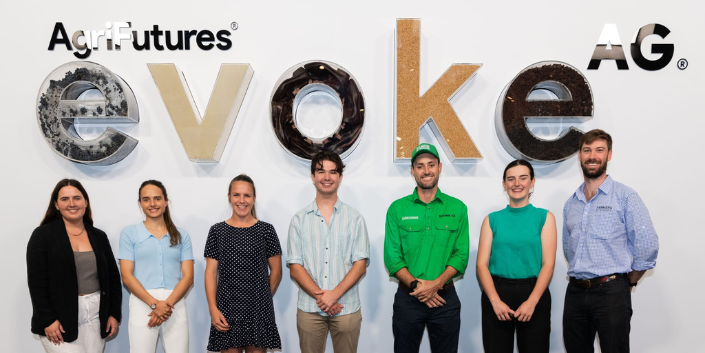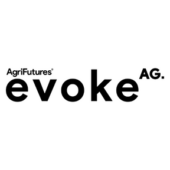Young leaders destined to shake up agriculture – applications are open for the evokeAG. 2024 crop of future young leaders
The search is on to find the next crop of emerging leaders, dedicated to the continuous improvement and prosperity of Australian agriculture and its value chain. Applications are now open and close Monday, 4 September 2023.

The AgriFutures evokeAG. Future Young Leaders program provides a platform for participants to share their key messages, innovations, and research projects with an international audience at evokeAG. 2024.
Through a comprehensive mentoring program, participants will gain the skills, networks, and connections to thrive in their careers.
So what sort of ‘exceptional edge’ does it take? Here’s some inspiration from the 2023 evokeAG. Future Young Leaders.
Matt Anderson: Putting farmers at the forefront of agritech adoption and tech development
Hailing from the Liverpool Plains in New South Wales, Matt Anderson trained and practised in law in the city before returning to the country to raise cattle and head up agritech projects at Famers2Founders, which supports innovative agrifood startups to deliver real impact in agriculture.
He’s urging researchers and startups to understand farmers’ needs before developing new technology.
RELATED: Don’t leave our farmers behind
“From my perspective, there’s not enough learning from farmers among innovators and developers, and too little focus on building capability for using technology on-farm,” Matt said.
“We are witnessing rapid innovation across the supply chain and world-changing research and development now and into the next decade but it’s important to recognise that change begins on-farm.”
Isaac Mayer: A passion for native bees and their role in pollination services
Another Future Young Leader, Isaac Mayer, got his first taste of agriculture as an 11 year-old in Sydney, looking after his school’s native beehive.
So inspired was Isaac by this experience that he saved his pocket money to buy his first native beehive and three years later started his own company called Native Bush Bees.
Now aged 18, Isaac looks after more than 100 native beehives and is a passionate advocate for native bees and their essential role in pollination, highlighting their resistance to common pests and diseases.
“I now recognise that a key to the future of agriculture lies in the untapped potential of the 75 per cent of children who live in the cities and have very little exposure to agriculture,” he said.
“All it took was a little nudge from my teacher to ignite my passion for native bees and a career in agriculture, but it could be chickens or a vegetable garden.
“So I go back to my primary school every year and open one of my hives for the kids with the hope of inspiring a new generation.”
Without experiences like this, Isaac believes young people will continue to choose careers in law, medicine and finance, while agriculture will miss out on the best and brightest.
“The most important thing I want to do is to give as many other young people as possible a little nudge towards agriculture,” he said.
RELATED: The search for the next generation of Future Young Leaders in agrifood is underway
Keeley Lester: A vision for ag education for all
When Keeley Lester took on her first job as a primary school teacher, she wasn’t expecting to be given a high school agriculture class simply because she’d grown up on a farm at Cuckoo in Tasmania.
The experience sparked both a passion for agricultural education and a realisation that many teachers are isolated, focusing on other subjects with agriculture tagged on as an ‘elective’ subject.
“There was no one else in my school to ask questions of or lean on because they’d never taught agriculture,” she said. “Ag is considered a specialist subject, it often only takes place in schools, where senior staff see its value, or there’s already an established school farm or garden space.”
Keeley’s developed Agducation, a resource for teachers of agriculture to diversify their strategies and discover new education techniques.
She hopes this will help support the teaching of agriculture in all environments.
“If that would happen we would be ensuring that our students know where their food comes from and how it come to be on their plate,” she said.
“We’d be making sure that they know where the natural fibres come from and who produces it.
“More than that, we’d be inspiring the future generations to look to our ag industry for their future careers.”
Josie Clarke: Advocating for disability in agriculture
As a five-year-old, Josie Clarke’s childhood changed in seconds, when her father became a paraplegic in a truck accident.
Growing up on a cattle property near Kempsey in New South Wales, her family’s experience with disability led her to set up Ability Agriculture, with the aim of increasing awareness, support and representation for disability in agriculture.
She’s determined to create career opportunities for the one in five Australians who have a disability.
“We are missing out on a market of extremely capable people with knowledge, skills and abilities if we don’t make agriculture more accessible for these people,” she said.
“Right now, words like diversity and inclusion on your company website are not cutting it, especially if people with disability can’t see themselves in your business, yet agriculture should be a place where we celebrate difference and diversity.”
In response, Josie is building an online platform called agcess, where people with disability can find jobs, connect with employers and enjoy the same spark, value and excitement that other employees find in agriculture.
“Whether the pathways are full-time, seasonal, online, part-time, remote, work experience, apprenticeships, internships or ag programs, Agcess isn’t just a place but part of the solution to make our industry more accessible,” she said.
RELATED: Josie Clarke is on a mission to change perceptions of people with a disability in agriculture
Jack Cresswell: Podcasting to progress agriculture
Fifth generation farmer Jack Cresswell and Founder of the Farm’s Advice podcast believes there’s value in sharing the success stories of agriculture along with the challenges.
“It was grandad telling me how he got through the drought and floods at Wilcannia, it’s telling your kids how to master sheep more efficiently, it’s empowering your team to use the resources and tools that you provide to grow,” Jack said.
“t’s easily seen through farmers becoming more confident in what we do because we all know that farmers learn best from farmers.”
This philosophy is something Jack put into practise in his podcast ‘Farms Advice’ and with more than 9,000 monthly listeners it’s clear that others agree.
“I was able to create, edit, and publish the farms advice podcast to pass on this knowledge from 150 experts in their field,” he said.
Jack’s encouraging farmers to share and seek out advice, believing that passing the knowledge is the only way to lift the industry to meet the target of $100 billion by 2030.
“How can we use this information, this platform for farmers to improve what we do, to retain the families on the land, and help them to become better? All in all, we’re as fast as our slowest farmers,” Jack said.
Malkah Lara-Muckenschnabl: Attracting the best and the brightest to ag
Malkah Lara-Muckenschnabl, a credit analyst in agribusiness at ANZ, has been giving a lot of thought to resumes, job applications and recruitment, wondering how agriculture might change the recruitment game for the better.
In response, Malkah is developing a ‘dating app for recruitment’ called Lymbo, which connects people in their voice, their language and their style of communication.
“Lymbo opens up the recruitment process by allowing applicants to tell their story, compared with the typical resume which recruiters and managers read for an average of only seven seconds,” she said.
“This app makes recruitment more accessible to young people and just as important, it gives employers the chance to make the job come alive, with videos of a typical workday, a scroll through to meet the team or a link to a podcast.
“While the non-negotiable skills like a driver’s licence or willingness to relocate are matched in the background, Lymbo focuses on the person and the connection, because a job is far more than filling in a resume.”
Realising how agriculture relies on its networks got Malkah thinking about what it is about them that makes them so effective in helping people to get jobs.
“Networks tells us what a resume can’t – the communication skills, the culture fit, the self-motivation and passion for the industry. Networks are one of agriculture’s biggest differentiators,” she said.
Amy Ferguson: Acknowledging past mistakes for a brighter future
In creating an agriculture sector for the future, agriculture science student Amy Ferguson believes the industry needs to be honest about the past.
The evokeAG. 2023 Future Young Leader is an advocate for soil health and regeneration, diversity and environmental respect.
She said her view of agriculture’s recently been challenged.
“It’s not often that the full complex truth is reflected upon, recognised or taken responsibility for in the agriculture sector,” Amy said, “The way that me and my family had been farming and the norms that we’ve perpetuated, celebrates agriculture only in the context of the past few 100 years.”
Amy argues that to move forward the agriculture industry needs to collaborate, share, learn from and walk together with First Nations peoples.
“Agriculture has existed here, for millennia, European agriculture was on the forefront of invasion. That picture isn’t always painted in our industry,” she said.
“We need to be upholding intellectual property rights, we need to have the willingness and the passion to collaborate, to share land, to learn and to walk together.
“We need to listen to the first agriculturalists of these lands- and quite frankly, we just need to tell the truth.”
Are you passionate about agriculture and rural communities with ideas, innovation or research to take the industry in Australia forward?
You could be evokeAG.’s next Future Young Leader, find out more and tell us about your exceptional edge 2024 Future Young Leaders – evokeAG.
If the Future Young Leader’s Program is not for you, early bird tickets are now on sale for evokeAG. 2024 to be held on 20-21 February 2024 in Perth, Western Australia. Following a sell-out event in 2023 we are encouraging delegates to secure their tickets, flights and accommodation early.
